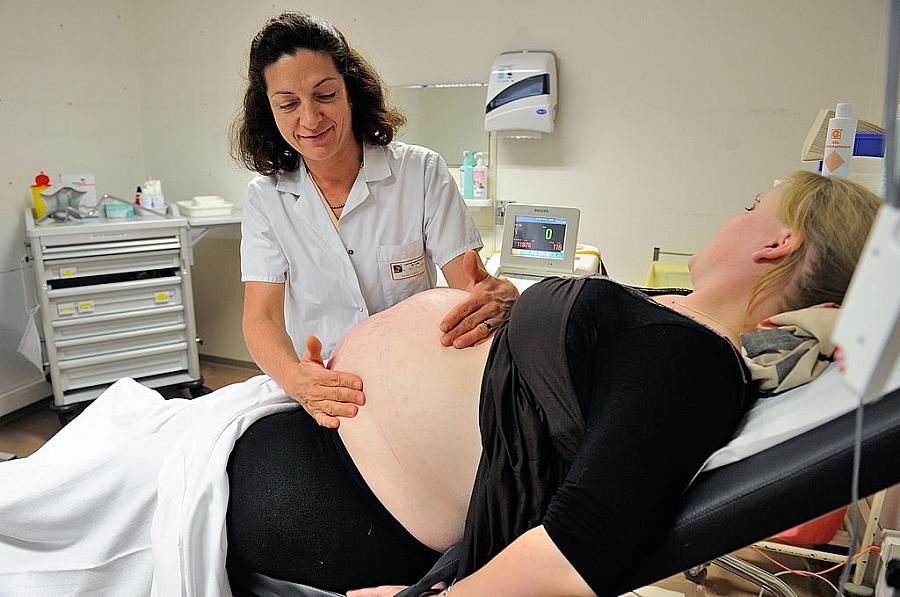Does giving no-strings cash to poor moms produce healthier babies?

Photo: Philippe Huguen/AFP/Getty Images
The concept of the universal basic income is having quite a moment in the media. From The New York Times, The New Yorker and The Wall Street Journal to PBS NewsHour, Bloomberg and Forbes, the idea of giving every citizen a basic annual income is reaching levels of peak buzz that can’t be explained by any single news hook — not even Switzerland’s recent referendum on the policy.
Guaranteeing every citizen an annual lump sum of money appeals to proponents across the political spectrum, and the proposal has also garnered interest as a response to fears of rising levels of automation and a corresponding loss of jobs in what tech columnist Farhad Manjoo calls “Robot America.” And there’s even some intriguing historical evidence that such income guarantees improve health and well being. The New Yorker’s James Surowiecki describes a short-lived 1970s program in Manitoba, Canada that lowered hospitalization and drop-out rates and “worked about as well as anyone could have hoped.”
So why is this media fervor spilling over into a children’s health blog? It turns out that current-day Manitoba might have even more to teach us about social policy and income supplements. A new study in the June issue of Pediatrics evaluates what happened to birth outcomes when pregnant low-income Manitoba women were given a no-strings-attached monthly income boost.
While Canada’s universal health care system already covers free prenatal care, Manitoba went a step further in 2001 with the Health Baby Prenatal Benefit. The program gives women with income below $32,000 Canadian (US $24,786) an income boost during the second and third trimesters of pregnancy. Unlike, say, U.S. food stamps, there are no restrictions on how the moms-to-be can use the money. (The amount is $81 Canadian a month — about US $63 — quite a bit less than the oft-cited $10,000-a-year figure in universal income schemes, and hardly universal, but the idea of a cash infusion with no conditions is similar.)
Researchers at the University of Manitoba and UC Berkeley looked at more than 14,500 women who gave birth in the province from 2001 to 2010 and compared those who received the benefit with otherwise similar women on welfare who didn’t. The analysis looked at variables such as birth weight, breastfeeding rates, preterm births and hospital stays. According to the study, it turns out that receiving the income benefit was consistently associated with better birth results:
[W]e found that receipt of an unconditional income supplement by very-low-income women during pregnancy was associated with several positive outcomes: increased breastfeeding initiation, reductions in low birth weight and preterm births, and shorter mean length of birth hospital stay.
Among families that received the benefit, there were 21 percent fewer babies with low birth weights and 18 percent fewer preterm births. Other differences, such as length of hospital stay for babies born vaginally, were statistically significant as well.
It’s not exactly clear why the added money had this salutary effect, and the study doesn’t pretend to know why. It may be that the funds allowed pregnant moms to buy better food, experience less financial stress or get better care. As one mom told CBC News, “I was getting the $80 a month cheque, which was totally the difference of me eating or not, so that helped tremendously.”
But the Pediatrics study is notably blunt in questioning the assumptions about human behavior that are baked into many social welfare programs, such as food stamps:
As a society, we tend to assume that poor people cannot be trusted to make good choices. Indeed, when the Health Baby Prenatal Benefit was first introduced in Manitoba, concerns were expressed about introducing a program for low-income women without conditions or accountability. Although information about prenatal and infant health is included with the monthly payment, the Manitoba HBPB program trusts low-income women to make good choices regarding their pregnancies. There is a growing body of evidence demonstrating improvements to child outcomes associated with increased family income that warrant attention from decision-makers.
While that last sentence is an impressively direct shout-out to policymakers, it’s hard to ignore the fact that this program lives in Canada. Regardless of Manitoba’s experience, a policy prescription that gives low-income moms cash infusions with no strings attached would have a tough cliff to climb in U.S. politics. In contrast, part of the nascent political appeal of the universal basic income is that it’s precisely that — universal. As The New Yorker’s Surowiecki points out, “For thinkers on the right, the U.B.I. seems like a simpler, and more libertarian, alternative to the thicket of anti-poverty and social-welfare programs.”
But for policy makers, this latest research does put useful pressure on the idea that all benefits need sturdy strings attached to protect poor folks from their own profligacy. Manitoba’s experience suggests that even a modest investment of about U.S. $63 a month for two-thirds of a pregnancy can pay dividends in the form of better birth results and healthier babies. That’s a return on investment that seems far more politically palatable than the astronomical costs of universal income schemes.
**

